Categories
Archives
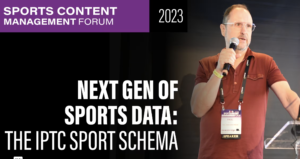
The IPTC Sports Content Working Group is happy to announce the release of IPTC Sport Schema version 1.0.
The first new IPTC standard to be released in more than 10 years, IPTC Sport Schema is a comprehensive model for the storage, transmission and querying of sports data. It has been tested on real-world use cases that are common in any newsroom or sports organisation.
IPTC Sport Schema has evolved from its predecessor SportsML. In contrast to the document-oriented nature of SportsML, IPTC Sport Schema takes a data-centric approach which is better suited to systems dealing with large volumes of data and also helps with integration across data sets.
“We reached out to many companies dealing with sports content and built up a clear picture of their needs,” says IPTC Sports Content Working Group lead Paul Kelly. “They wanted up-to-date formats, easy querying, the ability to handle e-sports and the ability to cross-reference between different media and data silos. IPTC Sport Schema addresses those requirements with a new basic model at the abstract end, and adhering to common use cases to keep things grounded.”
Content in Sports Schema is represented in the W3C’s universal Resource Description Framework (RDF), which renders any kind of data as a triple in the form of subject->predicate->object. Each component of a Sports Schema triple has a reference to an ontology, which defines the model at the heart of the standard. Querying is done using the W3C’s SPARQL standard, a kind of SQL for RDF.
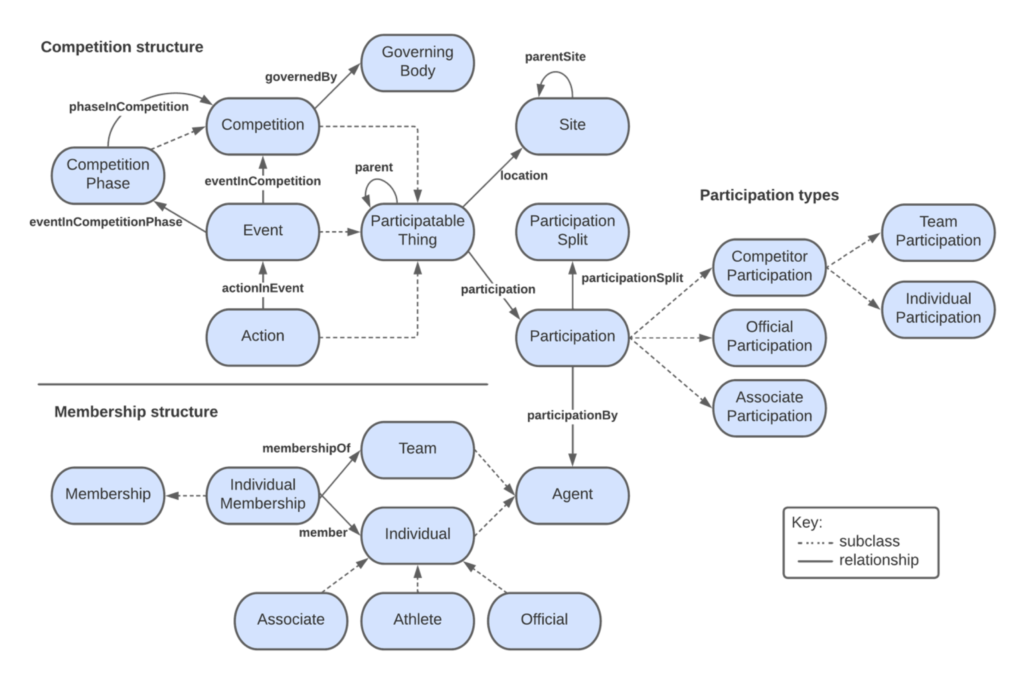
“The IPTC has been working on RDF and semantic web standards for more than 10 years, going back to rNews and RightsML,” said IPTC Managing Director Brendan Quinn. “So we are very happy to release another semantic standard that can help organisations to publish and share sports data in a vendor-neutral, interoperable way.”
Being RDF-based, IPTC Sport Schema can be rendered in XML, JSON and the simple Turtle format, and can be converted easily between all three formats using free tools such as Apache Jena.
“Those familiar with SportsML or SportsJS should recognise the basic components of Sport Schema,” says Kelly, “both in the ontology and in the sports vocabularies introduced with SportsML 3.0, which were designed specifically with semantic technologies in mind.”
To support take-up and share information about the new standard, the IPTC has created a dedicated website, sportschema.org. The site contains:
- a list of use cases which were used to help design the schema and data structures
- example instance diagrams for various sports to help understand how the model can be applied to team, individual and other types of sports
- a data dictionary comparing IPTC Sport Schema to other prominent sport schemas (SportsML, ODF, BBC Ontology, etc.)
- A detailed and comprehensive IPTC Sport Schema ontology reference showing all classes, relationships and properties.
- A tool to validate Sport Schema data using the SHACL format to ensure RDF triples adhere to the specification (equivalent to XML Schema or JSON Schema)
- A tool to covert SportsML documents to IPTC Sport Schema data
- A set of unit tests and sample data files that were used to develop and maintain Sport Schema, including a bespoke unit test framework that ensures our example SPARQL queries continue to satisfy our use cases as the model evolves.
Those wishing to try out some SPARQL queries against some sports data should visit Sport Schema’s query endpoint. It includes example queries showing how to build a team roster, league standings and more from our sample data sets.
For more information on IPTC Sport Schema, see the IPTC’s landing pages on the IPTC Sport Schema standard, the standalone site sportschema.org, or the project’s GitHub repository.
If you are interested in joining those who are working on implementing IPTC Sport Schema in your project or your organisation, we would love to hear from you. Please contact us via IPTC’s contact form.
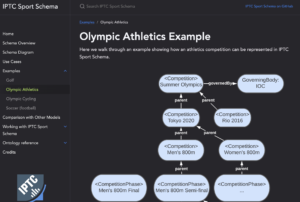
NEW YORK, NY, 26 JULY 2023: The IPTC today announced the beginning of a public feedback and review period of IPTC Sport Schema, which aims to be “the standard for the next generation of sports data.”
The announcement was made by Paul Kelly, Lead of the IPTC Sports Content Working Group, at the Sports Video Group’s Content Management Forum held at 230 Fifth Penthouse, New York.
“The SVG Content Management Forum is attended by senior tech experts from sports broadcasters and sports leagues from the US and around the world, so it is the perfect place to launch the IPTC Sport Schema,” said Kelly. “Many members of SVG have advised us on our work so far, including organisations such as Warner Bros Discovery, NBC Universal, PGA TOUR, Major League Baseball and Riot Games. Presenting our work at their event is a great way to say thanks for their help.”
While not yet an official IPTC standard, the IPTC Sports Content Working Group feels that the schema describing IPTC Sport Schema is solid enough to be published for public feedback.
Sports data for the era of linked data and knowledge graphs
The purpose of the IPTC Sport Schema project is to create a new RDF-based sports data standard, while making the most of the experience the IPTC has gained from the last 20 years of maintaining SportsML, the open XML-based sports data standard used by news and sports organisations around the world.
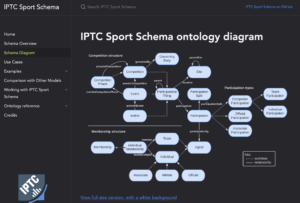
While XML served the industry well for many years, more recently developers and IPTC members have asked the Sports Content Working Group whether a standard would become available in a more modern serialisation format such as JSON, and whether knowledge graph protocols would be supported.
Because it is based on the W3C-standard RDF and OWL specifications, IPTC Sport Schema leverages the wide range of tools and expertise in the world of knowledge graphs, semantic web and linked open data, including the SPARQL query language, the JSON-LD serialisation into JSON format, inference using RDF Schema and OWL, and more.
“Using IPTC Sport Schema, sports leagues can choose to own their data,” said IPTC Managing Director Brendan Quinn. “Content publishers or sports leagues can publish open data on their website if they choose, in a way that can be re-mixed and re-used by others around the world.” IPTC Sport Schema can also be used for a more traditional model of aggregation and syndication by sports statistics providers who add value to the raw data being collected by sports leagues.
Like its ancestor SportsML, IPTC Sport Schema is created as a generic sports data model that can represent results, statistics, schedules and rosters across many sports. “Plugins” for specific sports extend the generic schema with specific statistics elements for 10 sports such as soccer, motor racing, tennis, rugby and esports. But the generic model can be used to handle any competitive sports competition, either team-based, head-to-head or individual.
As well as IPTC’s SportsML standard, the project is based on previous work by the BBC on its BBC Sport Ontology (some of its creators worked on this project). We have also consulted with and analysed related projects and formats such as OpenTrack and the IOC’s Olympics Data Feed format.
For more information on IPTC Sport Schema, please see the dedicated site sportschema.org, the project’s GitHub repository,
Those who are interested in the details can see an introduction to the IPTC Sport Schema ontology design, the full ontology diagram or full RDF/OWL ontology documentation,
There may be significant changes to the schema between now and when it is released as a fully endorsed IPTC Standard, so we don’t recommend that it is implemented in production systems yet. But we welcome analysis and experimentation with the model, and look forward to seeing feedback from those who would like to implement it in the real world.
People and organisations who are not IPTC members can give feedback by posting to the IPTC SportsML public discussion group or use the IPTC Contact Us form.
Home and away teams
alignment attribute.Pre-game actions
<actions>
<action sequence-number="1" team-idref="team_9572" type="esacttype:remove" comment="Nuke"></action>
<action sequence-number="2" team-idref="team_6134" type="esacttype:remove" comment="Inferno"></action>
<action sequence-number="3" team-idref="team_9572" type="esacttype:choose" comment="Cache"></action>
<action sequence-number="4" team-idref="team_6134" type="esacttype:choose" comment="Train"></action>
<action sequence-number="5" team-idref="team_9572" type="esacttype:remove" comment="Overpass"></action>
<action sequence-number="6" team-idref="team_6134" type="esacttype:remove" comment="Dust2"></action>
<action sequence-number="7" type="esacttype:remaining" comment="Mirage"></action>
</actions>
Statistics for eSports teams, players and tournaments
scoping-label on outcome-totals in SportsML:<team-stats score="16" event-outcome="speventoutcome:win"> <outcome-totals scoping-label="T" wins="4" /> <outcome-totals scoping-label="CT" wins="12"/></team-stats><player-stats> <rating rating-value="1.11"/> <stats> <stat stat-type="esstat:kills" value="15" /> <stat stat-type="esstat:headshot" value="6" /> <stat stat-type="esstat:assist" value="4" /> <stat stat-type="esstat:flashassist" value="2" /> <stat stat-type="esstat:deaths" value="11" /> <stat stat-type="esstat:KAST" value="78.3" /> <stat stat-type="esstat:ADR" value="68.4" /> <stat stat-type="esstat:FKdiff" value="0" /> </stats></player-stats>stat construction with stat-type and value we can handle any type of statistic.esstat: and esacttype: in these examples do not currently exist in the IPTC NewsCodes catalog but could easily be set up if needed. It might be necessary to have different prefixes for different type of eSports games. But that would require some more investigation.At the IPTC Spring Meeting in Lisbon, the IPTC Standards Committee signed off on version 3.1 of SportsML.
Updates include:
round-numberattribute added tobaseEventMetadataComplexType- Added
events-discardedtooutcomeTotalsComplexTypeandresult-statustobase3StatsComplexTypeto support events where players or teams can discard some of their results. - Fixed examples to use the correct qcodes
nprt:given,nrol:shortetc for names - Corrected description of
distanceinactionAttributes
You can download the ZIP Package of SportsML 3.1 with XML Schemas and documentation included.
Development of SportsML is open to collaboration. Your feedback on the SportsML Users Forum is welcome!
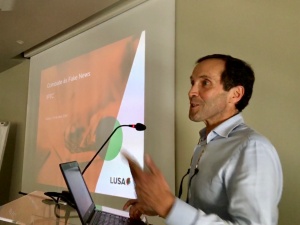
This post is part of a series about the IPTC Spring Meeting 2019 in Lisbon, Portugal. See Day 2 writeup and the day 3 writeup.
Last week brought IPTC members together for our twice-yearly Face-to-Face Meeting to discuss news credibility, taxonomies and controlled vocabularies, updates in sports standards and much more!
This year’s IPTC Spring Meeting was in Lisbon, Portugal, and over 40 IPTC member delegates, member experts and invited guests gathered for three days to discuss all the latest developments in news and media technology.
On Monday, IPTC Chair and Director of Information Management for Associated Press Stuart Myles gave a great introduction and overview of what was to come in the meeting. After everyone introduced themselves, Stuart discussed some changes that the IPTC Board has been thinking about, including looking at updating the Mission and Vision of the organisation to reflect how we operate in 2019.
Then Robert Schmidt-Nia from dpa Deutsche Presse-Agentur introduced their C-POP project (in collaboration with STT and the Sanoma group in Finland) which follows on from the Performing Content we saw at the previous meeting in Toronto. It was interesting hearing about the agency’s shift in focus from a strict business-to-business model to a “B2B2C” model thinking about what consumers needed and how agencies could help publishers to deliver on the needs of readers and subscribers, ideally using feedback from publishers to agencies on how well their content is performing according to real metrics like loyalty and subscription revenue. IPTC will be involved in the C-POP project so you can expect to hear more about this in the future.
On the same topic, Andy Read from BBC gave an overview of the “Telescope” internal measurement tool, showing how BBC staff can view in real time how their content is being consumed by region, topic or device.
James Logan from the BBC and Brendan Quinn of IPTC gave an overview of IPTC’s work with news trust and credibility projects The Trust Project and the Journalism Trust Initiative. We decided at the Autumn 2018 Meeting that IPTC wouldn’t create its own standard around news credibility, disinformation and “fake news”, but that we would work with existing groups and help them to incorporate their standards in IPTC’s work. With The Trust Project, that has been going well, and we are almost ready to publish some best practices on implementing the Trust Project’s Trust Indicators in NewsML-G2 content. Trust Project indicators are already used in schema.org markup by over 120 news providers so it’s great to see such strong uptake.
Separately we have been working with Reporters Sans Frontières’ Journalism Trust Initiative which is at an earlier stage and is looking at documenting general standards for trustworthy and ethical journalism. IPTC is part of the JTI’s Technical Task Force which is working with the drafting teams on making their statements specific enough to be answered with data and indexed by machines. Hopefully it will end up with similar indicators to the Trust Project indicators
With both news credibility projects, some questions still need to be addressed, such as assessing the credibility of claims (when a news organisation says they are trustworthy, how can you trust them!), and how these trust indicators work in a multi-provider workflow: if a news agency sends some content to a publisher who then merges it with original reportage, who determines the trust indicators that are attached to the final story? There is definitely a lot more work to do!
On the same topic, Dave Compton of Refinitiv gave an update on how the News Architecture Working Group has been looking at the Trust Project’s Trust Indicators and working them into NewsML-G2. As far as we have seen so far, no updates to the NewsML-G2 standard are necessary to support the new work. Martin Vertel from dpa showed us the API he created to give dpa’s clients access to Trust Project indicators for dpa stories. Building it with a browser-based JavaScript module opens up some interesting possibilities.
Joaquim Carreira from local agency Lusa showed us the “Combate Às Fake News” project focussing on media literacy and helping readers to know what to look for, including the idea of a “nutrition label” for news content looking at criteria such as factuality, readability and use of emotional language.
The day was rounded off with Johan Lindgren of Swedish agency TT presenting the recent work of IPTC’s Sports Content Working Group. The group has recently been tidying up the spec and incorporating suggestions for changes, plus looking at eSports and Chess as two non-traditional sports that are both seeing an increase in interest – in the case of eSports, it is becoming a huge industry. Our tests showed that in simple cases eSports results can be addressed with existing SportsML 3 structures, but to handle more detailed play-by-play results we may need to at least introduce a new controlled vocabulary. Please let us know if you would like to implement SportsML for eSports!
Johan also presented the draft of SportsML 3.1 to be voted on by the IPTC Standards Committee.
Stay tuned for an update on Days 2 and 3!
The IPTC has released a comprehensive set of sports controlled vocabularies as a supplement to the SportsML 3.0 sports-data interchange format, which was released in July 2016. These controlled vocabularies (CVs) are in the format of NewsML-G2 NewsML-G2 Knowledge Items plus RDF variants and are available on IPTC’s CV server at http://cv.iptc.org/newscodes.

There are 113 CVs representing such core sports concerns such as event and player status, as well as specialized lists for 11 sports (basketball, soccer, rugby, American football, etc.) for statistics, player positions, scoring types, etc.
“The SportsML 3.0 standard’s semantic tech capabilities are improved greatly by the new controlled vocabularies,” said Trond Husø, system developer for Norwegian news agency NTB, one of the early adopters of SportsML 3.0. “Data can be easily imported, structured, and stored.”
“When building a sports app you spend a lot of prep time defining your terms and building a schema,” said Paul Kelly, news technology consultant and lead for IPTC’s Sports Content Working Group. “By using SportsML 3.0, there is no need to reinvent the wheel.”
“You consider things such as ‘What sort of results and stats do we need?’ and ‘How will our system handle interrupted matches?’ IPTC’s vocabularies can get you on your way because they properly define in a standard format almost all the terminology you would use in a sports application: Everything from “goals-scored” to a full enumeration of status codes for sports events,” Kelly said.
For the Summer 2016 Olympics, NTB acquired the rights to distribute the results and data from the International Olympics Committee’s Olympic Data Feed (ODF). NTB then transformed ODF to SportsML 3.0, and then to NITF3.2. “Using SportsML to structure the ODF’s data is a broad and comprehensive solution to approaching all sports and competitions worldwide,” said Husø, who is also a member of IPTC’s Sports Content Working Group. “SportsML is now a truly flexible and universal format that can incorporate multiple vendor codes and still provide a defense against vendor lock-in.”
“Terms defined in another format such as ODF can easily live beside SportsML terms – as well as any other proprietary format – so that an organisation can build a repository of knowledge of all the different sports-data formats,” Kelly said.
Another advantage to the new SportsML 3.0 standard is that if new concepts are added to a sports vocabulary or modified in it, the data model and the XML Schema don’t change; they stay stable. It also supports all languages for the concept labels.
“A great feature is that we can translate the definitions to Norwegian – without changing or breaking the vocabulary,” said Husø. “If we were to distribute internationally, our domestic receivers could look up the definitions in Norwegian, while the international ones could use the English term.”
IPTC’s SportsML 3.0 standard underwent a major upgrade from version 2.2, after 12 years of evolution since its first version. The new standard incorporates contribution from sports experts in 12 countries. Its flexible core covers all major sports and events in most news reporting.
Other early adopters of SportsML 3.0 include Univision and the British Press Association in its new multi-sport API. Its major features include:
- compliance with IPTC’s NewsML-G2 standard
- a flexible core that covers all major sports and events in most news reporting
- plugins for detailed stats in 10+ sports
- a more flexible tournament model
- schedules, scores, standing, statistics, etc.
- choices between specific and generic terms
- controlled vocabularies, semantic tech capabilities
- schema redesign
- many samples and tool support.
Tool support for SportsML 3.0 includes 45 samples from 11 different sports and events, including both classic and SportsML-G2 examples, and both generic and specific examples.
The vocabularies will be maintained by IPTC for future expansion; new sports and terms can be added.
For more information on SportsML 3.0:
SportsML 3.0 Standard, including Zip package
SportsML 3.0 Specification Documents
NewsML-G2 Standard
Contact: Trond Husø @trondhuso, Trond.Huso@ntb.no

It’s an Olympic year for IPTC’s SportsML 3.0 standard, the recently released update to the most comprehensive tech-industry XML format for sports data.
Norsk Telegrambyrå (NTB), in Norway, is one of the first news organizations to implement SportsML 3.0, in time for the 2016 Games in Rio.
“We figured, why not use the latest technology available?” said Trond Husø, system developer for NTB, who worked on the standard’s update, released in July. “SportsML 3.0’s use of controlled vocabularies for sport competitions and other subjects now provides many benefits, including more flexibility. Storing results is also more convenient.”
SportsML 3.0 is the ideal structure and back-end solution used by many major news organizations because it is the only open global standard for scores, schedules, standings and statistics. “It saves the time and cost of developing an in-house structure,” said Husø, also a member of IPTC’s Sports Content Working Party.
The Rio Games, which will host about 10,500 athletes from 206 countries, for 17 days and 306 events, are revolutionary for big data and new approaches for managing it. For the first time, the International Olympic Committee (IOC) used cloud-based solutions for work processes including volunteer recruitment and accreditation.
And consider the experimental technologies and apps launched by key broadcasters and Olympic Broadcasting Services, the Olympic committee responsible for coordinating TV coverage of the Games: virtual reality footage, online streaming, automated reporting, drone cameras, and Super-High Vision, which is supposedly 16 times clearer than HD.
Billions of Olympic spectators worldwide have naturally come to expect real-time results and accurate scores to be delivered to them, with a side of historical perspective. All with little thought as to how the information reaches the public, be it via tickers on websites, graphic stats on TV screens, or factoids offered by commentators.
Schedules, competitors’ names, bio information, times, rankings, medalists – how does all of this data get served up so quickly and uniformly among networks and news services? And how does it get integrated into existing news systems, namely SportsML 3.0?
It starts with the IOC – the non-profit, non-governmental body that organizes the Olympic Games and Youth Olympic Games. They act as a catalyst for collaboration for all parities involved, from athletes, organiser committees, and IT, to broadcast partners and United Nations agencies. The IOC generates revenue for the Olympic Movement through several major marketing efforts, including the sale of broadcast rights.
The IOC produces the Olympic Data Feed (ODF), the repository of live data about past and current games. The IOC is responsible for communicating the official results; they use the specific ODF format for their ODF data.
Paying media partners sign a licensing agreement to use ODF, to report on results through their own channels, and build new apps, services and analysis tools.
The goal of ODF is to define a unified set of messages valid for all sports and several different news systems – so that all partners are receiving the same data, at the same time. It was introduced for the Vancouver Games in 2010 and is an ongoing development effort.
According to the IOC’s website, ODF plays the part of messenger. From a technical standpoint, the data is machine-readable. ODF sends sports information from the moment it is generated to its final destination via Extensible Markup Language (XML). XML, a framework for storing metadata about files, is a flexible means to electronically share structured data via the Internet, as well as via corporate networks.
IPTC’s SportsML 3.0 easily imports data from ODF. Using SportsML to structure the ODF’s data is a broad and comprehensive solution to approaching all sports and competitions worldwide. ODF has identifiers for sports and awards (gold, silver, and bronze medals) executed at the Olympic Games; sports outside of ODF are identified by vocabulary terms of SportsML.
“SportsML 3.0 provides one structure for the data for developers to work in,” said Husø. “The structure will be the same, even if there are changes to ODF in future Olympic Games; the import and export process of the data will not change.”
Among content providers that use SportsML (various versions) are NTB, AP mobile (USA), BBC (UK), ESPN (USA), PA – Press Association (UK), Univision (USA, Mexico), Yahoo! Sports (USA), and Austria Presse Agentur (APA) (Austria), and XML Team Solutions (Canada).
SportsML 3.0 is based on its parent standard, NewsML-G2, the backbone of many news systems, and a single format for exchanging text, images, video, audio news and event or sports data – and packages thereof. SportsML 3.0 is fully compatibility with IPTC G2 structures.
For more information on SportsML 3.0:
SportsML 3.0 Standard, including Zip package
SportsML 3.0 Specification Documents, IPTC’s Developer site
NewsML-G2 Standard
Contact: Trond Husø @trondhuso, Trond.Huso@ntb.no
The International Press Telecommunications Council (IPTC) released SportsML 3.0, the recently approved comprehensive update of the open and highly flexible standard for the interchange of sports data.
Developed by the Sports Content Working Party of IPTC, which includes organisations from eight different countries, SportsML 3.0 is designed to be easy to understand and implement, and covers the full gamut of sports events. Sports Markup Language is the tech-industry standard XML vocabulary for Sports scores, lineups, schedules, standings and statistics.
SportsML has been adopted by many international news organizations, including the BBC (UK), NTB (Norway), TT (Sweden), APA (Austria), AP (USA), and more. It has been applied to results from the Olympics, European football competitions, as well as the major North American sports leagues, for team, individual and head-to-head sports.
“We’ve had 12 years of input from sports experts at news organizations since SportsML 1.0,” said Paul Kelly, Chairman of the Sports Content Working Party and Director of Software Development at XML Team Solutions, a sports-focused agency. “SportsML 3.0 addresses the requirements of anyone handling sports results and statistics and will save the time and cost of developing an in-house format. Companies can also defend against vendor lock-in caused by adopting proprietary formats.”
Highlights of the new SportsML version include the public release of 113 sports-related controlled vocabularies (CVs). “The most important thing we did was design SportsML to play well with the current generation of semantic technologies,” says Kelly. These CVs cover the statistical properties, player positions, on-field actions, infractions, etc., of 11 sports plus 37 CVs that cover all sports. These will be available publicly as a package.
These terms can be combined with SportsML 3’s new generic stat structure to incorporate both IPTC and external properties, such as those published by the IOC or any other vendor. “You can easily add new properties and continue to process gracefully using the powerful vocabulary-management the IPTC has devised,” says Kelly. “That’s usually missing from even the most prominent sports formats.”
The specification and documentation can be downloaded from https://iptc.org/standards/sportsml-g2/. Additionally, the IPTC Developer Site provides technical information about SportsML, and the SportsML Users Forum is used to share experiences and raise questions, and also connects companies, organizations and vendors.